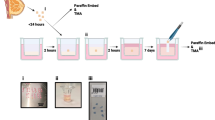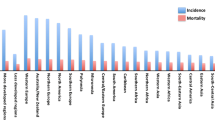Abstract
An intratumoral aromatase model in the ovariectomized nude mouse was developed which simulated the hormone responsive postmenopausal breast cancer patient. MCF-7, human breast cancer cells transfected with the aromatase gene, inoculated into ovariectomized nude mice are able to synthesize sufficient estrogens to enhance cell proliferation and the development of tumors. These tumors are responsive to both antiestrogens and aromatase inhibitors. However, letrozole was found to be more effective than tamoxifen and caused tumor regression, a result not previously noted in nude mice with endocrine treatments. When the aromatase inhibitors were combined with tamoxifen, tumor growth was suppressed to about the same extent as treatment with the aromatase inhibitors alone. Thus, there was no additive or synergistic effects of combining tamoxifen with aromatase inhibitors. These results suggest that letrozole has the potential to be more effective than tamoxifen for achieving greater reduction in estrogenic effects on tumors and uterus in postmenopausal breast cancer patients. In addition, sequential treatment with these agents is likely to be more beneficial to the patient in terms of longer response to treatment.
Similar content being viewed by others
References
Osborne CK, Hobbs K, Clark GM: Effect of estrogens and antiestrogens on growth of human breast cancer cells in athymic nude mice. Cancer Res 45: 584–590, 1985
Brunner N, Bronzert D, Vindelov LL, Rygaard K, Spang-Thomsen M, Lippman ME: Effect on growth and cell cycle kinetics of estradiol and tamoxifen on MCF-7 human breast cancer cells grown in vitro and in nude mice. Cancer Res 49: 1515–1520, 1989
Yue W, Zhou D, Chen S, Brodie A: A new nude mouse model for postmenopausal breast cancer using MCF-7 cells transfected with the human aromatasen gene. Cancer Res 54: 5092–5095, 1994
Yue W, Brodie A: MCF-7 human breast carcinomas in nude mice as a model for evaluating aromatase inhibitors. J Steroid Biochem Mol Biol 44: 671–673, 1993
Early Breast Cancer Trials Collaborative Group: Systemic treatment of early breast cancer by hormonal cytotoxic, or immune therapy: 133 randomized trials involving 31,000 recurrence and 24,000 deaths among 75,000 women. Lancet 39: 1–15, 1992
Fisher B, Costantino J, Redmond C, Poisson R, et al.: A randomized clinical trial evaluating tamoxifen in the treatment of patients with node-negative breast cancer who have estrogen-receptor-positive tumors. N Eng J Med 320: 479–484, 1989
Fisher B, Constantino JP, Redmond CK, et al.: Endometrial cancer in tamoxifen-treated breast cancer patients: findings from the National Adjuvant Breast and Bowel Project (NSABP-14). J Natl Cancer Inst 86: 527–537, 1994
Jordan VC, Rowsby L, Dix CJ, Prestwich G: Dose-related effects of non-steroidal antiestrogens and estrogens on the measurement of cytoplasmic estrogen receptors in the rat and mouse uterus. J Endocrinol 78: 71–78, 1978
Brodie A: Aromatase inhibitors. In: Pasqualinin JR, Katzenellenbogen BS (eds) Hormone-dependent Cancer. Molecular and Clinical Endocrinology. Marcell Dekker, 1995
Brodie AMH, Njar CV: Aromatase inhibitors and breast cancer. Seminars in Oncology 23,No 4: 10–20, 1996
Bhatnagar AS, Hauler A, Schieweck K, Lang M, Bowman R: Highly selective inhibition of estrogen biosynthesis by CGS 20267, a new non-steroidal aromatase inhibitor. J Steroid Biochem Mol Biol 37: 1021–1027, 1990
Demers LM: Effects of fadrozole (CGS 16949) and letrozole (CGS 20267) on the inhibition of aromatase activity in breast cancer patients. Breast Cancer Res Treat 30: 95–102, 1994
Letrozole International Trial Group (AR/BC2)
Brodie AMH, Schwarzel WC, Shaikh AA, Brodie HJ: The effect of an aromatase inhibitor, 4-hydroxy-4-androstene-3.17-dione, on estrogen-dependent processes in reproduction and breast cancer. Endocrinology 100: 1684–1695, 1977
Yue W, Wang J, Savinov A, Brodie A: Effect of aromatase inhibitors on growth of mammary tumors in a nude mouse model. Cancer Res 55: 3073–3077, 1995
Author information
Authors and Affiliations
Rights and permissions
About this article
Cite this article
Brodie, A., Lu, Q., Yue, W. et al. Intratumoral aromatase model: The effects of letrozole (CGS 20267). Breast Cancer Res Treat 49 (Suppl 1), S23–S26 (1998). https://doi.org/10.1023/A:1006028202087
Issue Date:
DOI: https://doi.org/10.1023/A:1006028202087




